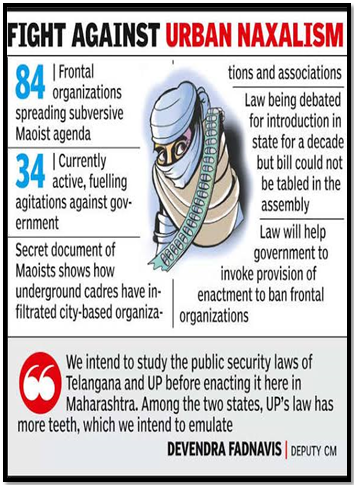MAHARASHTRA BILL TO CURB URBAN NAXALISM
Why in the News?
- The Maharashtra government has proposed a new bill to address the increasing presence of Naxalism in urban centers.
- Introduced in the Assembly by Deputy Chief Minister, the bill aims to tackle the involvement of Naxal front organizations in urban areas, which existing laws have been deemed ineffective against.
Key Provisions of the Proposed Law
- The bill empowers the government to declare any organization as “unlawful.”
- It outlines four main offenses: membership, fundraising, managing, and committing unlawful activities.
- Penalties range from two to seven years of imprisonment and fines between Rs 2 lakh to Rs 5 lakh.
- Offenses under the bill are cognizable and non-bailable, allowing arrests without a warrant.
Source: NWU
Comparison with UAPA
- The Unlawful Activities (Prevention) Act (UAPA) also designates unlawful associations but requires confirmation by a
Tribunal headed by a High Court judge.
- The Maharashtra Bill has an advisory board of qualified judges for the confirmation process.
- Unlike the UAPA, the Maharashtra Bill allows district magistrates or police commissioners to grant prosecution permissions, speeding up the process.
| Understanding Unlawful Activities Prevention Act (UAPA) 1967
Overview
Key Provisions
Recent Amendments and Scope
Associated Article: https://universalinstitutions.com/ai-and-the-issue-of-human-centricity-in-copyright-law/ |





